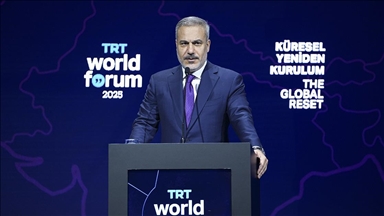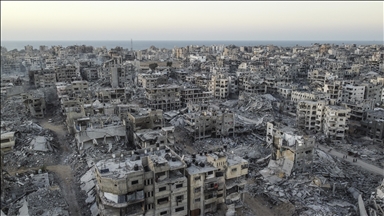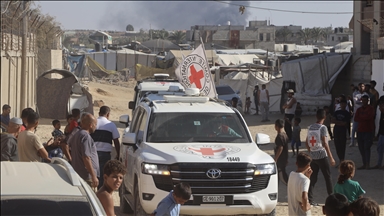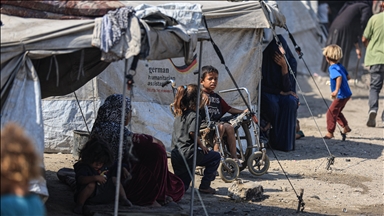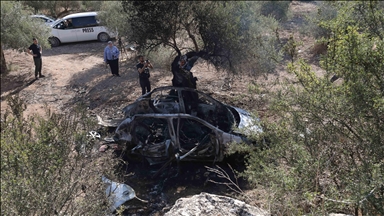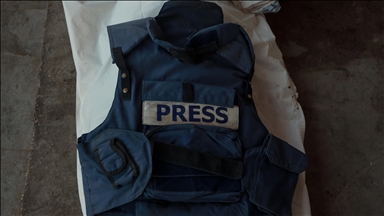2 years of genocide: How Israel pushed Gaza into famine
Israel triggered famine in Gaza through its ‘policy of using food and water as weapons of war and tools of genocide,’ says Ramy Abdu of Geneva-based Euro-Med Human Rights Monitor
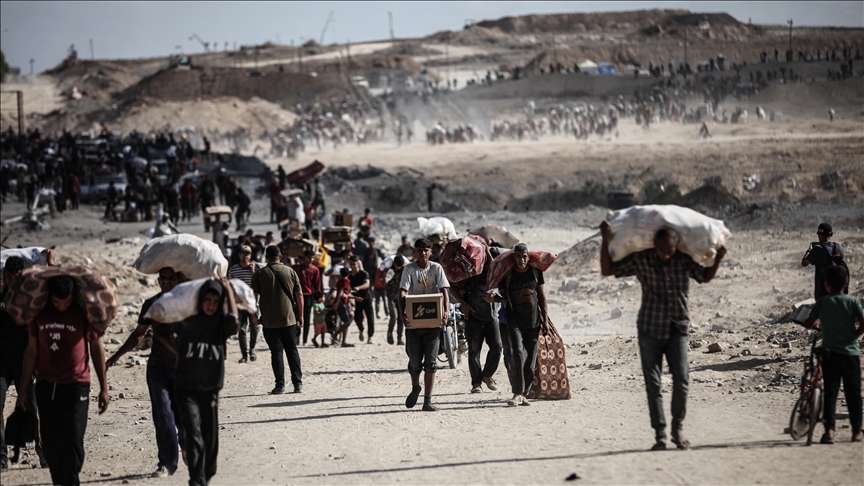
- Palestinian deaths linked to hunger and famine in Gaza have reached at least 460, including more than 150 children, while a UN inquiry has concluded that Israel is committing genocide in the enclave
- Israel ‘turned the vulnerability it had created over years into a weapon of slow annihilation,’ says Abdu
GENEVA
Israel has engineered famine in Gaza through a policy of starvation, experts and rights groups say, with each decision tightening the chokehold on food until hunger became inevitable.
The UN officially declared famine in Gaza in late August, confirming what several other watchdogs and experts had been saying for months prior. A month later, a UN independent international inquiry commission concluded that Israel has committed genocide in Gaza.
What followed was urgent and repeated appeals from top humanitarian figures such as UN relief chief Tom Fletcher, calling for an end to Israel’s “systematic obstruction” of essentials and aid – something that Prime Minister Benjamin Netanyahu and his government refuse to acknowledge.
For Ramy Abdu, chair of the Geneva-based Euro-Med Human Rights Monitor, this policy of blocking basic things necessary for human survival proves Israel’s intent to starve Gaza and kill more Palestinians.
“Gaza’s famine differs from others in that it is not the result of natural disasters or economic collapse alone,” Abdu told Anadolu. “Rather, it is a policy of using food and water as weapons of war and tools of genocide.”
He stressed that Israeli officials have openly stated this intent since the start of the war.
“Under international humanitarian law, starvation as a weapon against civilians is a war crime, yet in Gaza, this crime is being carried out explicitly and in plain sight,” he said.
‘Engineered fragility’ turns into ‘weapon of slow annihilation’
Israel has been devastating Gaza’s food security since long before October 2023.
It imposed a blockade in 2006 that gave Israeli authorities control over all border crossings and, at times, even calculated the daily calories permitted per Palestinian.
By 2023, four out of five Palestinians in Gaza relied on aid, youth unemployment hovered around 67%, and malnutrition-linked illnesses such as anemia were widespread, Abdu said.
“This engineered fragility left society unable to withstand any disruption in aid,” he said. “When Israel shut down the crossings, there were no local alternatives or production capacity to cushion the shock. Simultaneously, Israel bombed and bulldozed farmland, destroying Gaza’s food basket.”
The turning point came on Oct. 9, 2023, when Israel declared a “complete siege” on Gaza, cutting off food, water, fuel, and electricity. Imports stopped overnight, aid convoys were frozen at the border, and shortages deepened immediately.
With fuel blocked, bakeries shuttered, water pumps fell silent and trucks stopped moving. Food could not be baked, stored or delivered. Clean water disappeared, further compounding hunger with disease.
Abdu also pointed to farmland destruction and fishing bans, calling them part of a wider Israeli pattern of eliminating Gaza’s food sources.
“The occupation turned the vulnerability it had created over years into a weapon of slow annihilation,” he said.
Forced displacements deepen hunger
Israeli evacuation orders combined with relentless bombardment have repeatedly forced mass displacements, overcrowding shelters and straining already thin supplies.
Currently, an estimated 2 million Palestinians remain displaced across the devastated strip.
“Sudden flight often left people with nothing at all,” Abdu said.
Children and pregnant women were among the hardest hit. Hunger was compounded by disease and lack of clean water, to create what Abdu called “a full-scale crisis of food, health, and housing rights.”
By early 2024, Israel escalated its campaign against Gaza’s main humanitarian lifeline, the UN Relief and Works Agency for Palestine Refugees in the Near East (UNRWA).
Donor suspensions crippled the agency, warehouses were bombed, convoys blocked, and looting was reported.
Israel effectively barred aid to northern Gaza from early 2024 and tightened it further after the October offensive. In May 2024, the closure of Rafah sealed Gaza’s last crossing to the outside world.
A year later, in May 2025, Israel, with US support, launched the controversial Gaza Humanitarian Foundation (GHF) to oversee aid.
Instead of restoring access, it was denounced by the UN and major NGOs as militarizing relief, and the “aid zones” were described as “death traps.” Since then, more than 1,760 Palestinians have been killed while trying to reach food, nearly 1,000 of them near GHF sites, according to the UN human rights office.
“Tracing Israel’s actions and statements – the long blockade, closure of crossings, blocking of convoys, targeting of food warehouses, destruction of farmland, fishing bans, undermining UNRWA, looting of aid, attacks on civilians seeking food, strikes on police and security escorts, repeated unlawful evacuation orders and even the creation of the so-called Gaza Humanitarian Foundation – shows a clear pattern,” Abdu said.
“This is not random chaos but a carefully engineered policy of starvation.”
Famine declared, but no effective response
On Aug. 22, the Integrated Food Security Phase Classification (IPC) formally declared famine in parts of Gaza, meaning three critical thresholds – extreme food deprivation, acute malnutrition and starvation-related deaths – had been breached.
According to the Gaza Health Ministry, Palestinian deaths linked to hunger and famine have reached at least 460, including more than 150 children.
The worsening crisis has left one in every five children malnourished in Gaza City, with cases rising daily.
“Even after famine was officially declared, no effective measures followed. The international community has failed to compel Israel, which continues to flout UN resolutions with US and European backing,” said Abdu.
He added that famine recognition has value mainly in strengthening legal and moral consensus, and in laying groundwork for accountability before bodies like the International Criminal Court (ICC) or the International Court of Justice (ICJ).
“Under international humanitarian law, such deliberate starvation amounts to a war crime. With growing evidence of intent and outcome, these acts meet the threshold of genocide,” Abdu said.
‘Little has been done’
In September, the UN Independent International Commission of Inquiry on the Occupied Palestinian Territory, including East Jerusalem, and Israel concluded that Israel has committed genocide in Gaza.
After two years of investigations, the commission said Israeli authorities and security forces committed four of the five genocidal acts defined under the 1948 Genocide Convention – mass killings, causing serious bodily or mental harm, deliberately inflicting conditions of life intended to destroy Palestinians, and preventing births.
The commission concluded that “the State of Israel bears responsibility for the failure to prevent genocide, the commission of genocide and the failure to punish the perpetrators of genocide against the Palestinians in the Gaza Strip.”
“Israel must end its policy of starvation, lift the siege and facilitate and ensure the unimpeded access of humanitarian aid at scale and unhindered access of all United Nations staff, including UNRWA and OHCHR international staff, and all recognized international humanitarian agencies delivering and coordinating aid,” read the Sept. 16 statement.
Abdu emphasized that the declaration holds significant value but requires will for implementation.
“Labeling Israel’s actions as genocide should trigger obligations under the 1948 Genocide Convention, including prevention and punishment. That ought to mean political and legal pressure to guarantee aid delivery,” said Abdu.
“In practice, however, little has been done.”
Anadolu Agency website contains only a portion of the news stories offered to subscribers in the AA News Broadcasting System (HAS), and in summarized form. Please contact us for subscription options.


